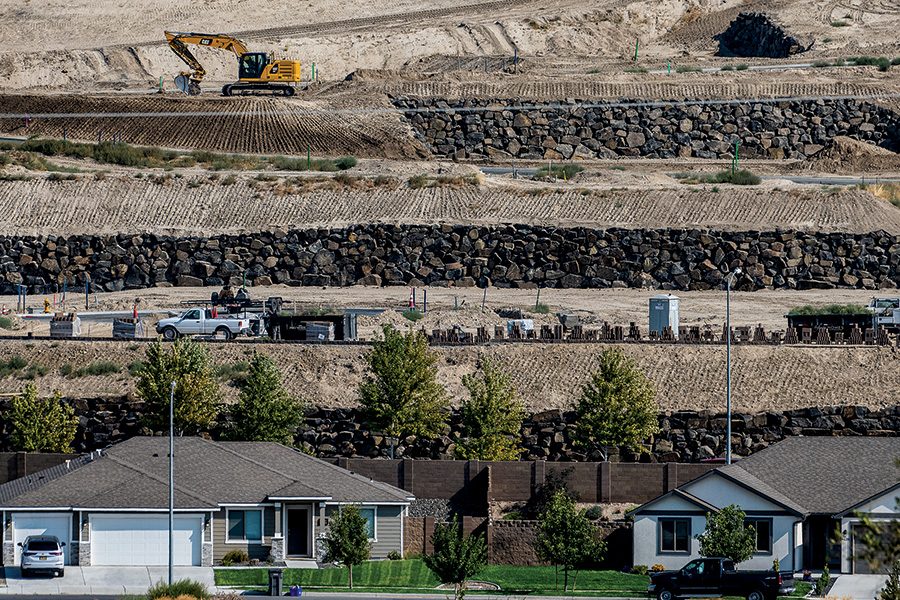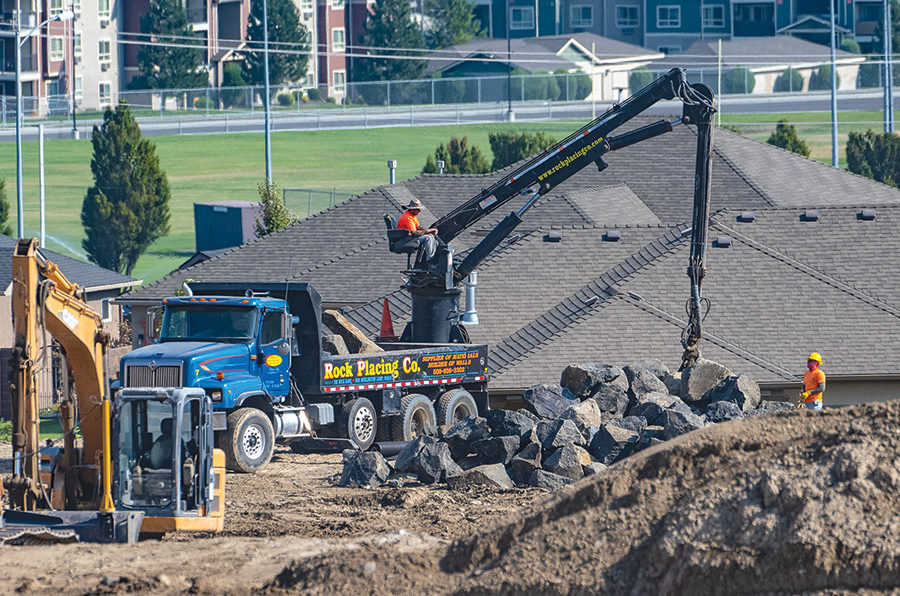
Home » City of Kennewick: A focus on infrastructure paves way for future growth
City of Kennewick: A focus on infrastructure paves way for future growth

October 17, 2022
Kennewick, at 85,320 residents strong, continues to expand, develop and reinvent.
“If you drive around our city, you can really see that we have progress and projects happening across all areas of Kennewick and there’s synergy. I think that’s important,” said Evelyn Lusignan, the city's director of public relations and government affairs.
The city’s population has grown 15% over the past 12 years, but growth slowed 0.6% from 2020-21, according to U.S. Census data.
Kennewick remains the king of retail sales, with $646 million recorded for the first quarter of 2022, up 5.6% over the previous year’s quarter. Taxable retail sales are transactions subject to the retail sales tax, including sales by retailers, the construction industry, manufacturing and other sectors.
The city issued 11% fewer building permits for single-family homes through August 2022 compared to the previous year, but Lusignan said home construction is still booming around the biggest city in the Tri-Cities.
Multifamily homes are under construction at Hansen Park and more are planned around the city.
The Southridge area also saw an explosion of new homes, especially along the rapidly developing Bob Olson Parkway.
Commercial growth
It’s not just the southern edge of town that’s growing.
In the downtown area, private investors opened The Public Market @ Columbia River Warehouse, which Lusignan calls a link in the downtown revitalization chain.
“It’s helped make the connection between the core historic downtown area to the waterfront … We really applaud those businesses that took the first step and made the investment to be there,” she said.
Summer’s Hub, a food truck dining destination at 6481 W. Skagit Ave., near Chuck E. Cheese, opened over the summer, offering indoor and outdoor seating as well as an outdoor stage for live performances.
The Port of Kennewick has launched efforts to sell land for development at Vista Field and Columbia Gardens Urban Wine and Artisan Village and soon at Clover Island.
Through the Covid-19 pandemic, projects have kept rolling in, slowing at times, but growth has never stopped, Lusignan said.
Some projects, such as the Three Rivers Convention Center expansion which would include a Broadway-style theater, seven-story hotel and commercial space, have had their due diligence periods extended.
The replacement of Fire Station #1 at Sixth Avenue and Auburn Street is underway and expected to be complete in a year.
Schools and other critical infrastructure also are continuing to be built anew and updated on a rolling basis, like the Kennewick High remodel and additions, alongside complementary private investments in business.
Lusignan emphasized that it’s also ongoing investment in the infrastructure that the public doesn’t necessarily see or take note of that enables the community to continue to grow.
“It’s important that citizens see that we’re investing in all of those layers,” she said.
The city’s 2021-22 budget was $421.6 million, and the capital project budget is $68.2 million.
Water meters
In August 2022, Kennewick began work to upgrade its 26,000 water meters throughout the city, both residential and commercial, to convert them to modern remote-read “smart” setups.
“Many of our current water meters have reached the end of their useful life and require replacement. The upgrades will include exchanging the current water meters for new meters with Advanced Metering Infrastructure (AMI), or replacing registers on newer meters that do not require a full replacement,” Lusignan said.
AMI uses a low-powered communication device that transmits hourly water usage information over a secure network.
Homes and businesses are without water for 10 to 15 minutes while the meter or register is replaced. Organizations dependent on water such as dental offices can coordinate with the city and its contractor to complete the work at a time that will cause less disruption to business.
After the $10.8 million project wraps up in late 2023, Kennewick residents will be able to track water usage in real time via a software program.
“This will provide valuable consumption information to the city and customers for water conservation efforts and leak detection,” Lusignan said.
Previously, it took staff two months to get readings from the entire city.
“I’ve been with the city for 28 years, and we were talking about doing this in the future when I started,” she said.
Though the technology isn’t new, it took a long time for the hardware to prove itself.
Over the years, the city tested out different meters, but they often failed after a few years due to the damp conditions the instruments were exposed to either from proximity to irrigation boxes or melting snow. Battery life also has improved.
“It’s very visible and expensive, so we want to make sure it’s going to work and have a high level of confidence,” Lusignan said. “We talked to a lot of cities and had a consultant who helped us make sure we got the right meters and made the right choice.”

Roadwork ahead
While the Ridgeline Drive and Highway 395 underpass project wraps up in the Southridge area, the next big road improvement will be at the Gage Boulevard and Steptoe Street intersection, set to break ground in spring or summer 2023.
The project will add double left-turn lanes and single right-turn lanes on all approaches. Additional work includes improving signal operations and updating accessible ramps and lighting.
“A grant through Benton-Franklin Council of Governments and the Federal Highway Administration has awarded funding to the city to acquire right of way, provide design engineering and construction,” Lusignan said.
When the project opened for bids in July 2022, the city received only one, which was higher than the engineer’s estimate and therefore rejected by the city council. Lusignan said the city will re-advertise the project in December 2022 or January 2023.
As early as fall 2023, improvements to the Deschutes Avenue and Columbia Center Boulevard intersection will begin. Work includes adding a right-turn lane on Deschutes for westbound traffic turning onto Columbia Center Boulevard.
The work precedes the future addition of a third lane for both north and southbound traffic on Columbia Center Boulevard.
Wastewater plant
The city is preparing for a $29.1 million overhaul of the city’s wastewater treatment plant facilities, due to get underway in summer 2023.
The current setup uses older treatment technology involving open lagoons where treated wastewater sewage goes to settle out. Separated solids are then dredged every few years at a cost of about $1 million and disposed of by an outside contractor, Indiana-based Merrell Brothers.
The planned plant improvements will convert money out the door into a revenue stream for the city. As city wastewater department workers like to say of the existing odor from the plant: “Smells like money.”
Lagoons will be traded for greenhouses which will take treated wastewater, with most of the liquid pressed out, and dehydrate what’s left into fertilizer that can be sold commercially.
“We will be on the front lines of technology with that plant,” Lusignan said.
The new plant is modeled after FloridaGreen in Florida, built by Merrell Brothers. City officials toured the plant and a small-scale pilot was conducted prior to committing to the new concept.
The city plans to accept treated waste from other municipalities to make additional revenue.
Construction + Real Estate
KEYWORDS october 2022




